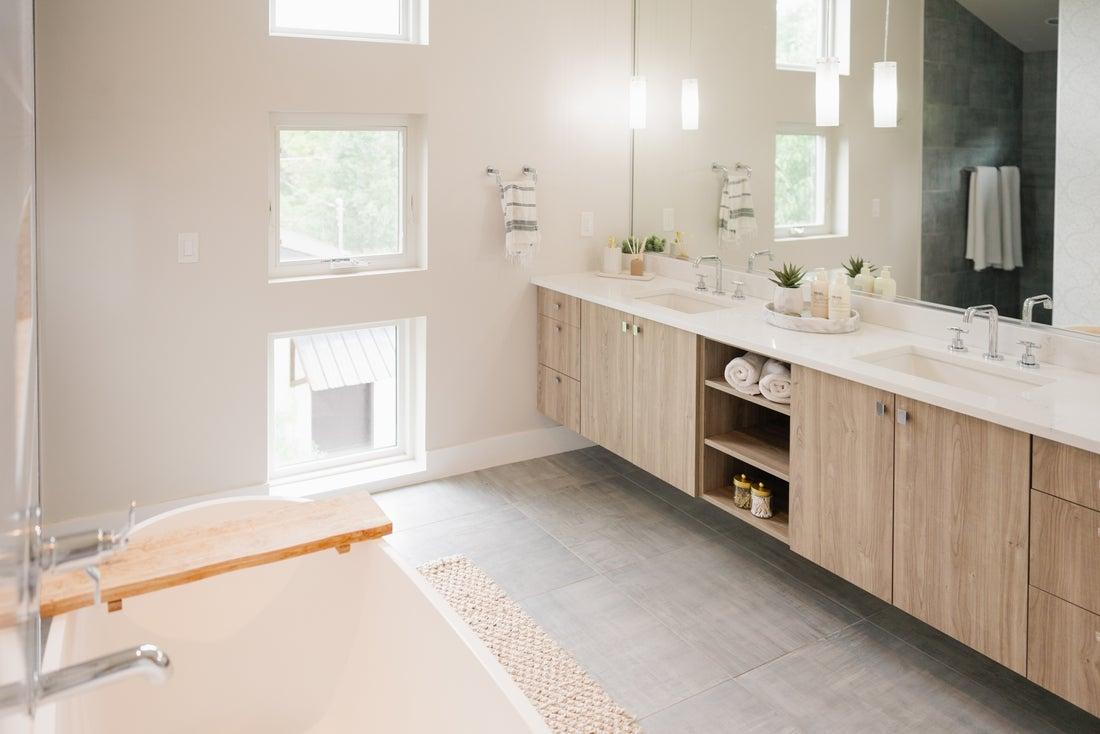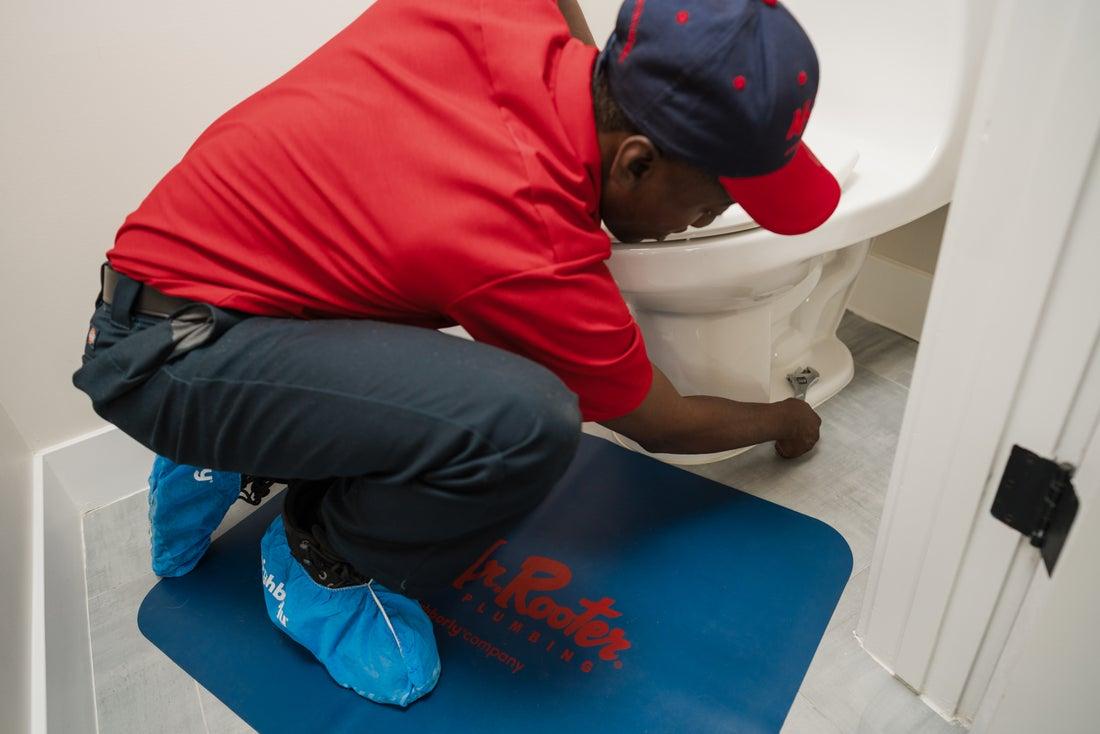
You don’t always expect your bathroom to smell pleasant. Still, you certainly don’t expect it to smell like sewage. If it does, you may be dealing with a severe plumbing issue that requires the expertise of the best plumbing company in your area.
There can be many possible causes of a bathroom that smells like sewage, including shower drain clogs, septic tank problems, and even sewer gas leaks. Learn about the potential causes below so you can take action and give those awful odours their marching orders.
Your Shower Drain Is Clogged
Damage potential: Low to Moderate
Plumber required: Rarely
If the smell of sewage tends to be particularly strong around your shower, you may have a clogged shower drain. The good news is that most instances of shower drain clogs are straightforward to remedy.
Drain clogs can often happen when whatever you wash down your drains builds up inside them, making it harder for water to pass through. Hair, soap scum, and general debris can attract bacteria, which can be responsible for some pretty unpleasant smells!
Fortunately, you may not need to find a plumber in your area just yet. There are many home remedies you can try first to clear your shower clog and say goodbye to that unpleasant sewage-like odour.
Method #1: Hot Water
In some cases, tipping hot water down your drain can be enough to clear blockages that primarily consist of soap scum. You may like to repeat the process a few times and see if it makes a difference to the level of smell in your bathroom.
Method #2: Baking Soda and Vinegar
When your shower drain becomes clogged, a simple solution of baking soda and vinegar can sometimes be all it takes to unclog it. Pour one cup of baking soda down your shower drain, followed by one cup of vinegar and one cup of hot water combined.
Once the mixture has been poured into your drain, cover it with a tight seal, such as a drain stopper, and wait 10 minutes. You can then run the bath tap or shower and see if it has cleared the clog. If it hasn’t, you can repeat the process or ring a licensed plumber you trust.
Method #3: Drain Snake
If you have access to a drain snake, also known as a drain auger, put it to work to see if it takes care of your pesky shower clog. Follow the steps below:
- Insert the drain snake into your shower drain
- Keep feeding it down the drain until you come across resistance in the form of a blockage
- Rotate the drain snake to adhere to the blockage materials
- Pull the snake out of the drain with the clog attached
- If nothing comes out, or only a small amount of the blockage does, repeat the process
Drain snakes are a common piece of equipment in the average plumber’s toolkit. If you don’t have a drain snake or feel confident using one, your local plumbing service provider can use one for you.
Learn more about how to fix a clogged shower drain
Your Sewer Has Backed Up
Damage potential: Low to high
Plumber required: Depends on the volume of sewage
A sewer backup can undoubtedly be why your bathroom smells like sewage. After all, it’s literal sewage. Fortunately, a sewer backup doesn’t always spell bad news or costly repairs. In some cases, sewers can become overloaded after heavy rain, causing sewer gases to be pushed back into homes. The smell may be awful, but the damage potential is usually minimal.
However, sewage smells relating to sewer backup can sometimes indicate a severe problem, especially if actual sewage is being pushed back into your home that isn’t associated with bad weather. When this happens, there’s potential for pipe damage, illnesses, and property damage.
If sewer backup is the cause of the sewage smell in your bathroom, call an emergency plumbing services provider for help. Alongside performing any plumbing sewer repairs, they can also install a sewer backflow preventer, or backflow valve, into your sewer lines.
P-Trap Problems
Damage potential: Moderate
Plumber required: Sometimes
P-traps are U-shaped bends in the pipes in our properties, including shower drain pipes. Their job is to trap water to prevent sewer gases from returning to our homes and businesses.
Sometimes, P-traps stop performing this very important job. As a result, they can be why bathrooms end up smelling like sewage. Your P-trap may be broken, which can require the assistance of a trusted plumber to fix it.
If not broken, P-traps can also be dirty. In this case, you may notice more of a musty smell than a sewage-like one. When you have a dirty P-trap, you can clean it by pouring one cup of baking soda followed by one cup of vinegar down the drain. Cover the drain for 15 minutes, and then run your tap.
An infrequently used bathroom can also be why your P-trap isn’t doing its job, causing a sewage-like odour. If the water in your P-trap has dried out, it can cause sewer gases to enter your home. In this instance, running the water can be enough to solve this problem.

There’s a Sewer Gas Leak from a Broken Toilet
Damage potential: Moderate
Plumber required: Yes
A broken toilet can be a common cause of sewage smells in bathrooms, which you’ll need your local plumber to help with. In many situations, the wax seal around your toilet can fray, causing sewer gases to leak into your bathroom.
Replacing the wax seal on a broken toilet can involve uninstalling the entire toilet, which is typically a job for a plumbing company or 24/7 plumber. Failure to hire your nearest plumber may mean you make the problem worse!
If a frayed wax ring is to blame, consider whether now is an excellent time to consider a toilet upgrade or even a bathroom remodel. Most plumbers are happy to install new toilets rather than reinstall your old ones.
Your Septic Tank Is Full
Damage potential: Low
Plumber required: No
While most homes in Canada are connected to municipal sewer systems, not all are. In fact, at least 15% of Canadian households use septic systems to treat their wastewater. When you don’t know how often to pump a septic tank, it’s easy for them to get full and start backing up into properties.
Solving the smell of sewage in your home can be as straightforward as hiring a business that offers septic tank pumping services. A septic tank pump out and maintenance may solve the problem and keep your home free of sewage smells for at least 12 months or more.
There’s Bacteria Growth In Your Sewer Lines
Damage potential: Low
Plumber required: No
It can be uncomfortable to think about, but sewage smells can sometimes be attributed to bacteria growth in your sewers. After all, they create the perfect environment for bacteria. Sometimes, this bacteria can end up as far up your sewage lines as your toilet bowl.
Fortunately, smells caused by bacteria growth are typically easy to solve. You can use homemade cleaning solutions like baking soda and vinegar. You may also see the value in hiring residential and commercial drain cleaning service providers. With technology like drain hydro jetting, you can simultaneously take care of bacteria growth, blockages, and sewage smells.
How to Prevent Sewage Smells In Your Home
Most homeowners and business owners would prefer never to smell sewage inside their bathrooms. While some situations in which you smell sewage in your house or business premises are unavoidable, some are avoidable. You may be able to prevent unpleasant sewage-related smells by taking these actions:
Clean Your Drains
Whether you use home drain cleaning methods like baking soda and vinegar or a drain snake or hire a residential or commercial drain cleaning service provider, drain cleaning can be an ideal way to eliminate sewage smells. This is particularly true if the smells are caused by bacteria growth or a blockage. Don’t underestimate the importance of regular business and home drain cleaning to prevent unpleasant scents.
Hire a Trusted Plumber
Depending on what you think is causing the smell of sewage in your house, you may want to call a plumber during standard business hours or an emergency plumber offering 24 hour plumbing services.
When you’re not confident in solving the problem yourself, an experienced plumber can take the lead for your peace of mind.
Use Your Bathrooms
When you have multiple bathrooms in your home, you likely prefer to use some more than others. This can sometimes mean that P-traps in infrequently used bathrooms dry out, resulting in sewage-like odours.
Avoiding this issue can be as easy as using all bathrooms in your home. Alternatively, get into the habit of running the water to keep water in the P-trap, which will stop sewer smells from entering your home.
Inspect Your Vent Pipe
If you regularly notice a septic smell in your bathroom near your toilet and even near the walls, your vent pipe might be to blame. This can often be the case if it has been improperly installed or cut.
The job of your vent pipe is to regulate air pressure in your home plumbing system while also redirecting odours outside your house to stop them from ending up inside. When they aren’t properly installed, odours can be directed inside your property.
Fortunately, vent pipe installation-related issues are easy enough to solve with the help of a nearby plumber. They can diagnose the problem and reinstall a new pipe.
The same rules apply to vent pipes that have cracked or split. Plumbers can use a smoke machine to fill the pipe, find out where it’s leaking from, and repair it to stop those awful sewage smells.
Inspect Your Sewer Lines Often
We expect our sewer lines to operate at their best at all times. It’s also hard to know when they aren’t functioning at their best when they’re buried underground. You may be able to prevent sewage line-related odours in your home by scheduling regular sewer camera inspections with a trusted plumbing service provider.
Your chosen plumber can inspect your entire sewer line, looking for possible problems that may need to be solved now or in the future. You can then take action to prevent or stop those problems from worsening.
Book Regular Septic Tank Pumping
Pumping septic tanks may be the furthest thing from your mind most days, but it can be worth scheduling on your annual calendar to prevent sewage smells. When septic tanks aren’t regularly pumped, sewage can back up in drains, causing unpleasant odours and even putting your septic system at risk of damage.
Contact a trusted septic system service provider to ask about the most suitable pumping frequency for keeping your septic tank and drain field in excellent condition. It may then be easier than you think to prevent awful smells in your home.

Plumbing Companies Near Me: Call Mr. Rooter Plumbing to Eliminate Bathroom Sewage Smells
Whether you know what has caused your bathroom to smell like sewage or you need help diagnosing it, Mr. Rooter Plumbing is here to help. Your locally owned and operated Mr. Rooter Plumbing can assist with both diagnosing and solving your sewage smell problems.
Many Canadian homeowners and business owners prefer Mr. Rooter Plumbing in their area for some of the following reasons:
- Locally owned and operated
- Professionalism and courtesy
- Uniformed professionals
- Over 50 years of experience
- Guaranteed parts and workmanship
- Licensed and insured service providers
- In-home estimates*
- No overtime charges*
- Upfront, flat-rate pricing*
*Not available in all Mr. Rooter Plumbing locations. Please contact your local Mr. Rooter Plumbing to learn more.

